
An economic recovery is taking hold in Britain and is set to “gain momentum,” says the International Monetary Fund.
The leading economists nudged up their growth forecast for the UK this year from 1.1% in April to 1.2%, and 1.4% for 2026.
“After a slowdown in the second half of 2024, an economic recovery is under way and is expected to gain momentum,” the IMF said in its latest analysis of the UK.
With the UK economy having grown 0.7% in the first three months of the year, Chancellor Rachel Reeves welcomed the latest report.
She stressed: “The UK was the fastest growing economy in the G7 for the first three months of this year and today the IMF has upgraded our growth forecast.
“We’re getting results for working people through our Plan for Change – with three new trade deals protecting jobs, boosting investment and cutting prices, a pay rise for three million workers through the National Living Wage, and wages beating inflation by £1,000 over the past year.”
But with millions of households struggling to make ends meet in an ongoing cost-of-living crisis, the Washington-based think tank warned of the damage caused by Donald Trump’s tariffs on the UK and the risks to the economy’s recovery.
“The forecast assumes that global trade tensions lower the level of UK GDP by 0.3 percent by 2026, due to persistent uncertainty, slower activity in UK trading partners, and the direct impact of remaining US tariffs on the UK.”
Planning reforms and increases in infrastructure investment, it added, could “increase potential growth if properly implemented”.
But it also highlighted potential blows to the economy ahead.
“Tighter-than-expected financial conditions, combined with rising precautionary saving by households, would hinder the rebound in private consumption and slow the recovery,” the IMF predicted.
“Persistent global trade uncertainty could further weigh on UK growth, by weakening global economic activity, disrupting supply chains, and undermining private investment.”

The Bank of England should continue to cut interest rates “gradually, while remaining flexible in light of elevated uncertainty,” argued the IMF.
But with inflation having hit 3.5% in April, it added: “Calibrating the monetary policy stance has become more complex, given the recent pickup in inflation, still fragile growth, and higher long-term interest rates.”
The IMF praised the Government for striking a “good balance between supporting growth and safeguarding fiscal sustainability”.
Ms Reeves has faced heavy criticism for her “jobs tax” hike in National Insurance contributions for employers in the Budget last autumn.
But the IMF stated: “The new spending plans are credible and growthfriendly, taking account of pressures on public services and investment needs.
“They are expected to provide an economic boost over the medium term that outweighs the impact of higher taxation.”
However, with Sir Keir Starmer and Ms Reeves under pressure from Labour MPs to scale back welfare cuts and having done a U-turn on winter fuel payments, the IMF added: “It will be important to stay the course and deliver the planned deficit reduction over the next five years to stabilize net debt and reduce vulnerability to gilt market pressures.
“In the longer term, the UK will face difficult choices to align spending with available resources, given ageing-related expenditure pressures.”







